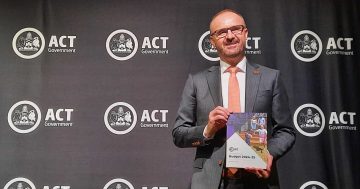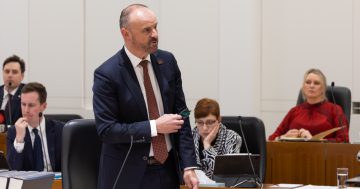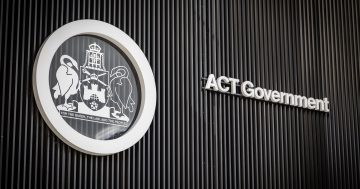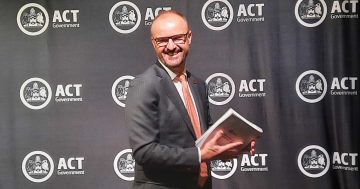
Chief Minister and Treasurer Andrew Barr outlining the new forecasts in the mid-year budget review. Photo: Claire Fenwicke.
Lower Territory debt, higher revenue but also higher costs – they’re some of the details released today (9 February) as part of the ACT Government’s 2022-23 Budget Review.
An extra $50 million could also be found over the next four years as the government cracks down on people renting out their principal residence.
The review has updated the figures from the 2022-23 Budget Estimate, showing the ACT is now forecast to be $461.5 million in debt, an improvement of $21.5 million. This is also forecast to be lower every year of the forward estimates and is a cumulative improvement of $261.3 million over four years.
Chief Minister and Treasurer Andrew Barr said the main factor driving the Budget’s improved position was increased revenue from GST, particularly through 2022.
“There was a lot of money that had been saved by households during the pandemic and during lockdowns that they then went out and spent on goods and services that were taxable under the GST,” he said.
“Our strong labour market and near-full employment has also seen payroll tax go ahead of rates as the Territory’s single largest own source of revenue stream.
“I think that’s probably the first time in the Territory’s history the payroll tax has taken the number one position as the largest source of revenue for the Territory government … in recent times, this is a new trend.”
According to the Budget Review, total revenue is expected to be $318.7 million higher in 2022-23 and $969.7 million higher over four years to 2025-26 than previously forecast.
Own-source taxation revenue, including payroll tax, increased by $125.8 million in 2022-23, while there was an estimated $89.5 million increase in GST revenue.
However, there will be lower Suburban Land Agency, City Renewal Authority and Icon Water dividends and income tax equivalents of $29.6 million in 2022-23, but an increase of $59.9 million over four years.
The ACT population will increase to half a million people by 2027 and while a larger population delivers more GST revenue, it also means more needs to be spent to deliver services.
Total expenses in 2022-23 are expected to be $257.6 million higher than forecast and $614.5 million higher over the four years to 2025-26.
New infrastructure projects announced as part of the Budget Review include additional funding to support the design and construction of the John Gorton Drive and Molonglo River Bridge, upgrading energy infrastructure to supply the Woden and Tuggeranong bus depots and support the operation of up to 300 battery electric buses, additions to the Canberra Hospital expansion and the relocation of the Southside Child and Adolescent Mental Health Service.
Land tax revenue is expected to be $17.4 million higher in 2022-23 and $59 million higher over the four years when compared to the Budget Estimates.
Of that, $50 million of additional revenue is expected from cracking down on people dodging land tax, such as those who had declared a home as their primary residence but are, in fact, renting them out.
Mr Barr said there was a lot of property data available online which would let the government know who wasn’t declaring land use correctly.
“It doesn’t take too much sleuthing to match up rental databases, publicly available, with information on ‘is that property currently on the land tax system’,” he said.
“The advice to me from our revenue office was that there was a need for some additional resources to focus on compliance in this area.
“If there is a leakage in the tax base, it means those people who do the right thing are paying more than they should.”
Mr Barr also said the government would be going further with stamp duty cuts in upcoming budgets.
“The housing market was overheating last year, and so … we’re expecting the impact of interest rate increases to reduce the turnover in terms of properties on the market,” he said.
“As prices have been falling quite substantially, there is a link between property value and stamp duty collected, so the forecast for residential stamp duty collections is that they will continue to decline.
“That’s the nature of the housing market and substantially why we’ve been moving away from stamp duty as a source of revenue because it goes up and down depending on the housing market.”
Rates will rise but only through inflation.
They’re currently scheduled to be raised by 3.75 per cent.
One key risk to the economic outlook is rising interest rates and the uncertain impact of how high inflation will hit household budgets.
As the cost of living continues to bite, Mr Barr said it was possible relief for Canberrans would need to take priority over budget repair.
“We might need to increase the amount we put into a number of measures,” he said.
It’s hoped negotiations with the Commonwealth would provide some of that monetary relief through bilateral agreements.
Mr Barr was optimistic that even if a recession occurs, as predicted by some economists, the ACT would be well protected.
“I think the ACT has proven to be more resilient and somewhat counter-cyclical,” he said.
“If the economy does look like teetering on the edge of a recession, then a number of economic stabilisers kick in, such as Federal government spending and that tends to flow through our economy first.”
The 2023-24 Budget will be delivered in June.





















